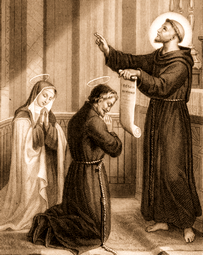Lives of the Saints
Our Models and Protectors
Spiritual Bouquet:
April 28

Blessed Luchesio
Confessor, First Franciscan Tertiary
(† 1241)
Luchesio was a merchant of Poggibonzi, a city not far from Siena, Italy, who found politics and commerce more interesting than the service of God and the salvation of his soul. This man had a very dear wife by the name of Bona Dona, and he possessed a prosperous business. But neither the joys of his home life nor the success of his commerce had satisfied his ambition, since he felt destined for a brilliant public life, and desired to enter into the society of the rich. To attain that goal, he was striving to increase his receipts by unjust practices and rash speculations. To make matters worse, he joined the fratricidal combats between the city-states which were wreaking havoc and ruin on the Italian peninsula. Saint Francis of Assisi was traveling about in Toscany, however, announcing the Word of God and calling souls to penance. Sometime around 1221 he came to Poggibonzi, and the whole population turned out to hear him, including the merchant Luchesio. The gift to touch his heart was given Saint Francis, with the grace of God. How fail to be touched, indeed, hearing the Saint preach on "that Being without beginning or end, immutable and inexpressible, ineffable, incomprehensible, beyond the grasp of creatures, Who is blessed, praised, glorious, exalted, sublime, most-high, lovable, delectable, and forever worthy above all else, of being sought and desired! And after his sermon Francis saw Luchesio come to introduce himself, asking what he should do to gain Heaven.
Saint Francis at that moment had a revelation from on High. By it he understood that Luchesio was to be the one who first of all would adopt the Rule of the third Order, which for some time he had been intending to initiate. And he went to visit Luchesio at his home and made known his plans to him and his wife: "For quite some time I have been thinking of establishing a Third Order, by means of which people living in the world, and in particular those who are married ,will be enabled to serve God more perfectly. I think you could do no better work than to inaugurate it. Immediately Luchesio and Bona Dona accepted the proposition. Soon afterward, the Saint received them with joy and gave them habits made of a plain cloth, with a cord for cincture. He also gave them the rules which later were approved by Pope Nicolas IV, and of which it has been said that justice and democracy in Italy had their source in the little notebook where the Saint wrote down the Rule of the Third Order. The happy new tertiaries resolved to give all their fortune to the poor, reserving for themselves only their house and a garden which they could maintain without hired help.
After this, Luchesio completely abandoned politics and business to concern himself only with his salvation and the works of mercy. This speculator well-known as such to his co-citizens, this man formerly so harsh towards others and avid for profit, became the just and charitable Christian of that city, and his house, which was the place of reunion for the first Fraternity, also became known as "The Inn for the Poor". He not only received the poor into his house, he went out to search for the sick in swampy regions infected with malaria, and became their Providence also in their abandonment. He would go out with a little donkey to procure, or beg if necessary, what was needed for their convalescence. In this Bona Dona seconded him with all her strength.
He was a great penitent, and had the gift of mental prayer extending even to ecstasy; yet it was charity which remains his most memorable quality. He and his beloved spouse fell ill on the same day; declining rapidly, Luchesio sent for their Franciscan chaplain. Having received from the priest the Last Sacraments, he heard that Bona Dona was in agony. He found the strength to go to her and take her hands in his, encouraging her to her very last breath. Carried back to his bed, he gave up his blessed soul to God, without further delay.
The only glory that Luchesio could not evade was that of having been the first member of the Third Order of Saint Francis which has saved so many souls: he stands at the head of the providential offshoot planted at Poggiabonsi. In the 13th century already, fourteen beatified or canonized tertiaries are counted. In 1694 the Friars Minor obtained from Pope Innocent XII permission to celebrate a feast day in honor of Blessed Luchesio, on the 28th of April. He was chosen by his native city as its patron, and his feast day is one of obligation there.
Mgr Paul Guérin, Les Petits Bollandistes, Vol. V, p. 65. Revue du Tiers-Ordre et de la Terre-Sainte, 1902, "Le bienheureux Luchesio, p. 150-154; 1911, p. 443. R.P. Damase Danveau, O.F.M., À la suite de Saint François: le Tiers-Ordre. Éditions o.f.m. de Paris, 1941; p. 44, 64.